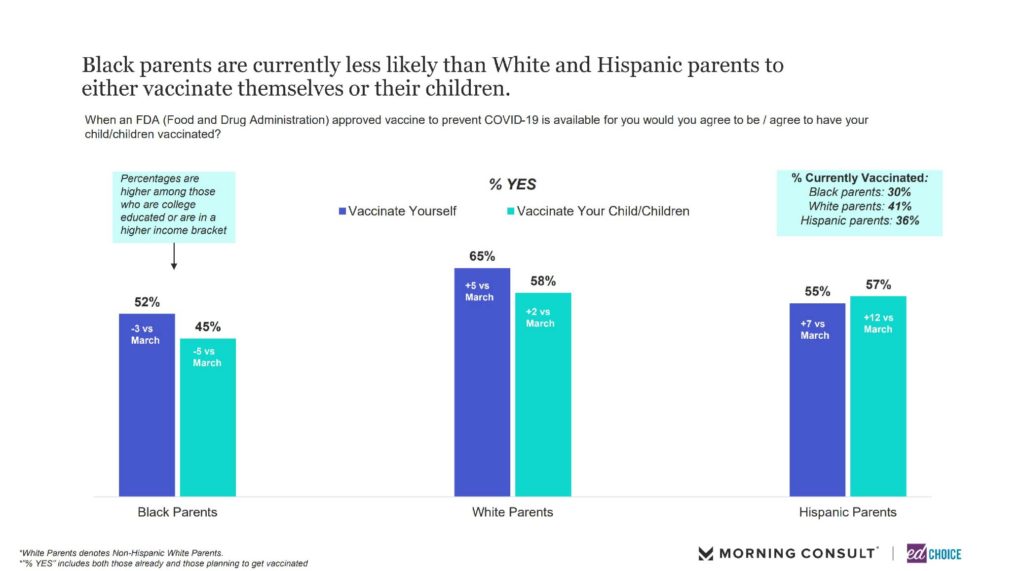Public Opinion Tracker Deep Dive: Perspectives of Black K-12 Parents (April 2021)
With case rates dropping rapidly, the pandemic appears to be winding down in the United States. Over the coming months, parents, teachers, and school leaders will make important decisions about how to pick up the educational pieces and move forward. Because Black students and families have experienced learning disruptions and other consequences of COVID-19 differently from other groups, we seek every month to better understand their unique perspectives, concerns, and preferences.
In April we collected completed surveys from 405 Black parents of K-12 students. That includes an oversampling of 300 Black parents. We also obtained survey responses from a nationally representative sample of 1,134 K-12 school parents.
In a nutshell: Higher shares of Black paraents support charter schools, private school vouchers, and education savings accounts or ESAs. While Black parents are more comfortable with in-person education than they were at the beginning of the calendar year, their comfort levels have not improved over the last month as much as other groups. Black parents are more likely to say a given resource will help their child succeed next school year. In the long term, Black parents are more likely to prefer schooling to occur both at the home and out of the home. Unlike most other groups, Black parents report less likelihood of getting themselves or their children vaccinated against the coronavirus. Below, we explore some of these key findings in greater depth.
1. Black parents support three major school choice policies more than white parents. While school choice policies are overwhelmingly popular across all major demographics, Black parents were particularly supportive. When given a description, Black parents are more likely to say they support a school choice policy than white parents. For charter schools, 74 percent of Black parents are supportive compared to 73 percent of white parents. Support for vouchers is substantially higher, at 81 percent among Black parents, ten percentage points higher than the supportive share of white parents. Notably, there was essentially no difference in support between low-income Black parents and high-income Black parents. 80 percent of Black parents support education savings accounts (ESAs), compared to 76 percent of white parents.
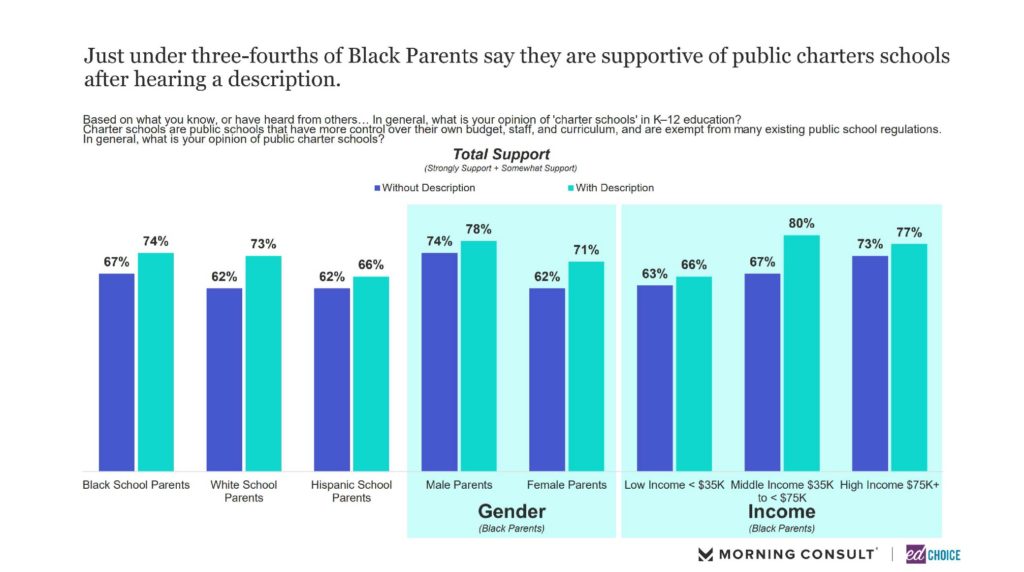
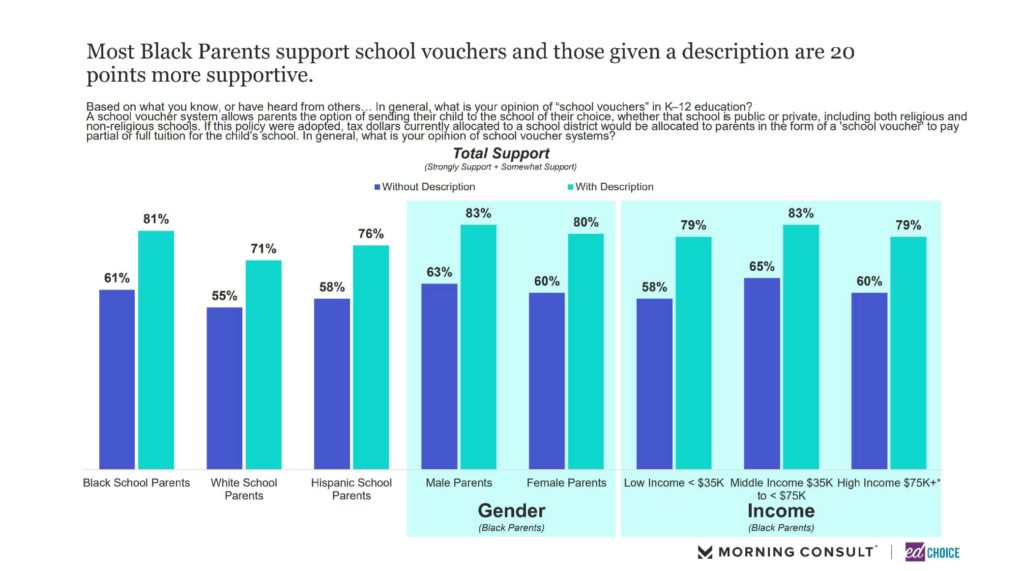
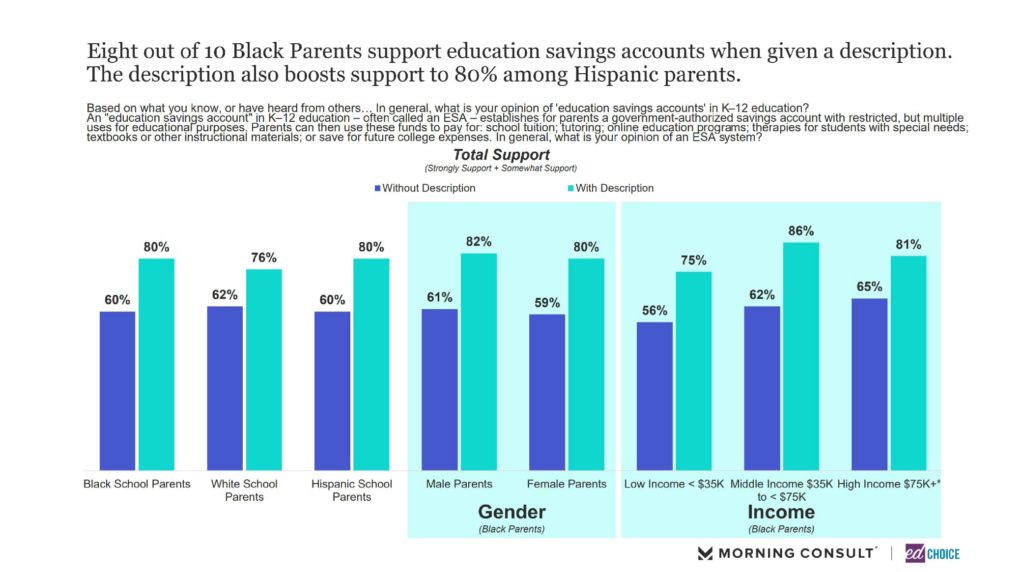
2. Comfort with in-person education has improved little since March. In February, we saw a significant jump in parents who were comfortable sending their kids back to classrooms, with half of parents indicating comfort for the first time since October. It took until March for Black parents to reach that 50 percent mark. While parents collectively continued to grow more positive about in-person education from March to April, opinion among Black parents barely changed at all. In sum, the share of Black parents indicating comfort with in-person education is 15 percentage points lower than that of white parents and eight points lower than Hispanic parents.
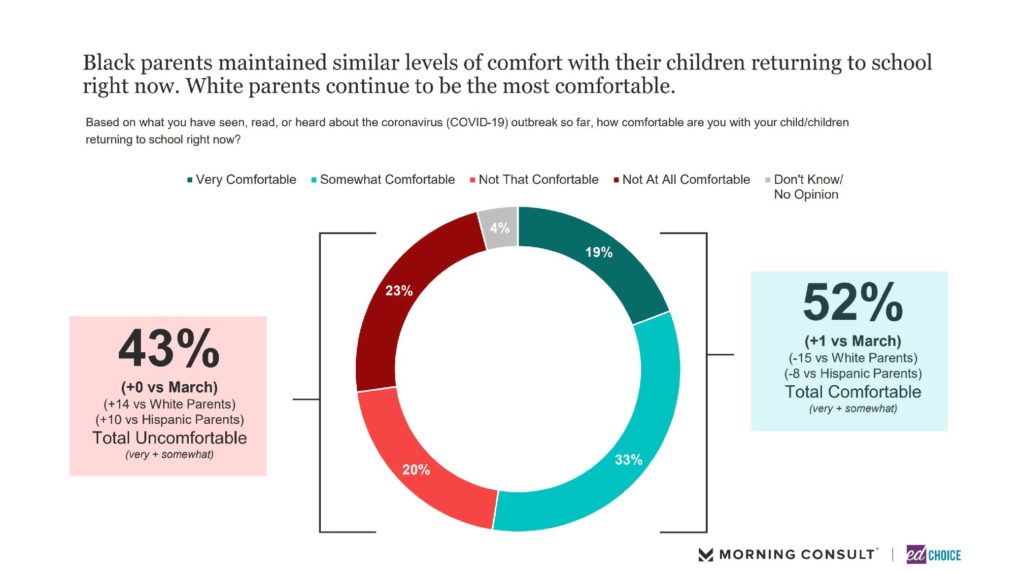
When focusing on classroom safety in light of COVID-19, Black parents are less likely to think schools will be safe by the fall. While 61 percent of all parents think the virus will be contained enough to send children to classrooms by September, only 49 percent of Black parents agree.
3. Black parents are significantly more optimistic about the helpfulness of various educational resources. Parents were asked how a variety of educational resources might be helpful to their children next school year. For each suggestion, Black parents were more likely to indicate a resource would be at least somewhat helpful to their children than white parents did, though the ordering was essentially the same. Both Black and white parents had laptops, high-speed internet, and individualized learning plans (IEPs) as the three most helpful resources, but positive responses from Black parents outpaced those from white parents by seven, eight, and five percentage points respectively. The biggest gap was in response to offering weekend school days for more instructional time, at nine percentage points.
Notably, Hispanic parents were more positive than either white or Black parents regarding the helpfulness regarding the helpfulness of mental health support, additional summer school offerings, grade repetition, weekend school days, and longer school days.
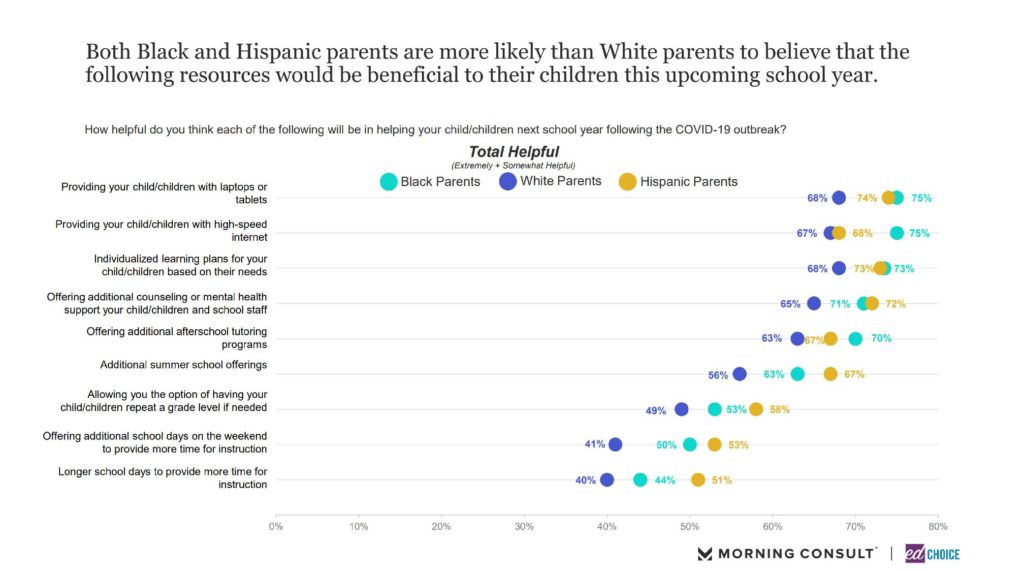
4. Black parents are more likely to want some amount of schooling at home. When given the option of all five school days of the week educating outside the home, completely inside the home, or one to four days at home, only 34 percent of Black parents said they would prefer schooling to take place completely outside of the home, 11 percentage points lower than white parents. Most of that difference was made up in preference for a mix of at-home and out-of-home education, with 48 percent of Black parents saying they would prefer a mix compared to 40 percent of white parents. Over half (55%) of Hispanic parents expressed preference for a combination of home-based and out-of-home schooling.
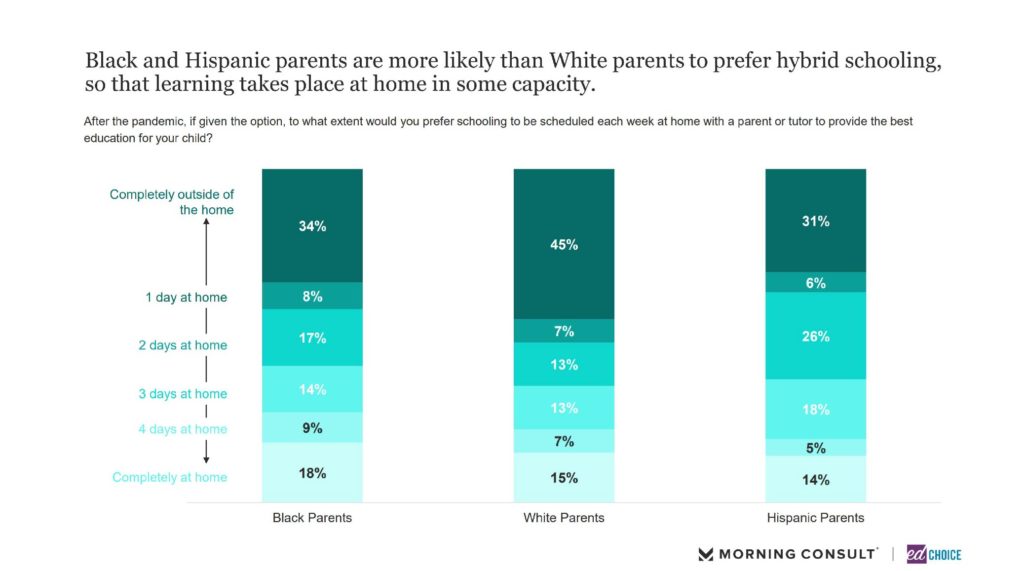
Black parents also are more likely to be interested in learning pods. More than two out of five Black parents said they were in or looking to join a pod, five percentage points higher than March’s total. Over half (55%) of Hispanic parents were at least interested in a pod.
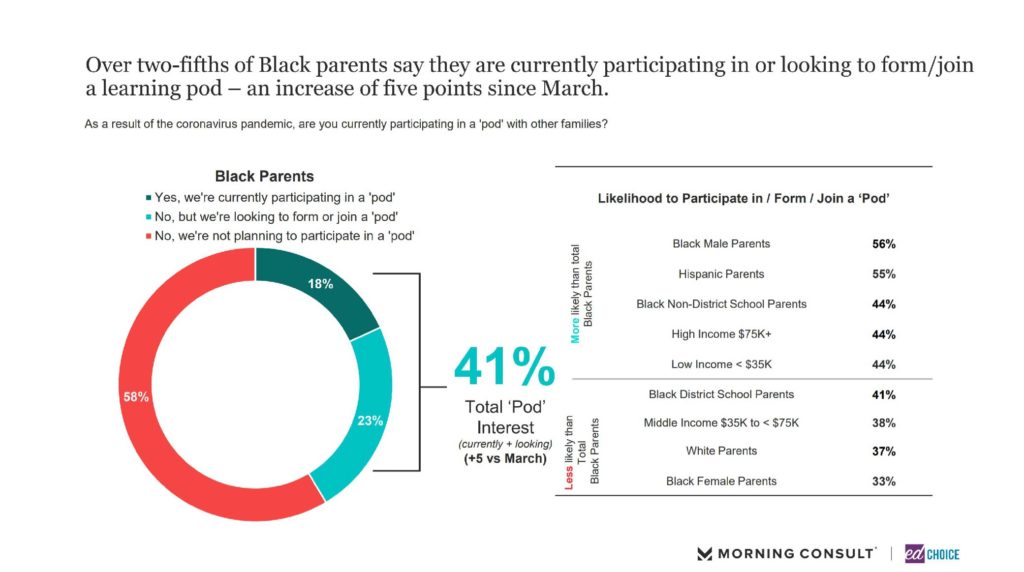
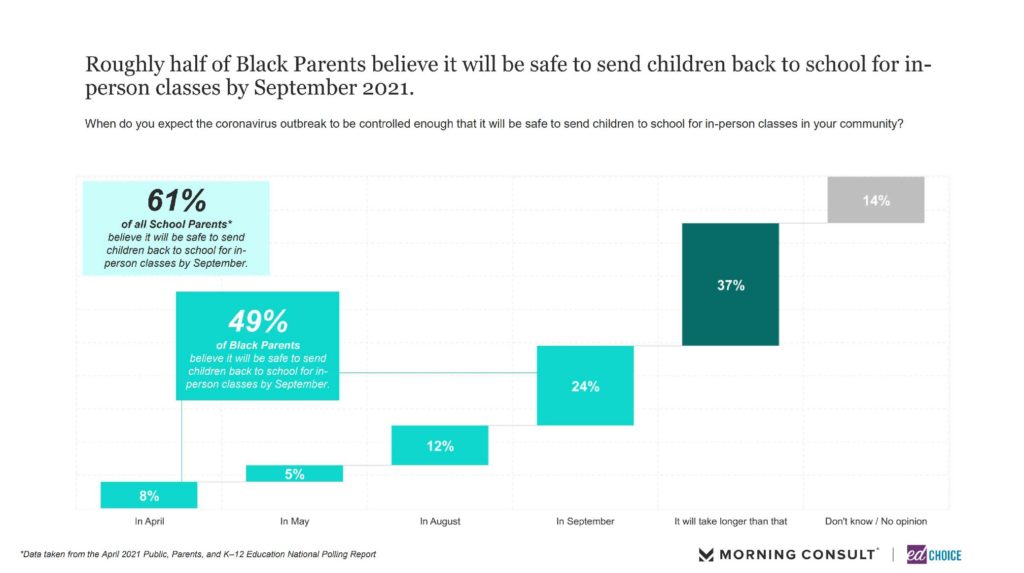
5. Black parents indicate less support for vaccinating themselves or their children than they did in March. While the share of white and Hispanic parents indicating they are currently vaccinated or plan to be vaccinated against COVID-19 has increased every month the vaccine has been available, Black parents were less enthusiastic in April than they were in March. Fifty-two percent of Black parents have been or planned to be vaccinated, down three percentage points since March, and 45 percent planned to vaccinate their children when possible, five points fewer than the previous month.
